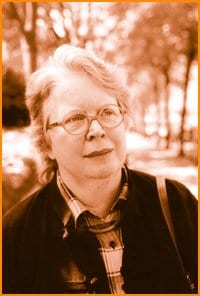The freedom for secular university instructors and students to question Judeo-Christian morality without facing a lawsuit for discriminating against Christians is at stake in a trial now before the BC Supreme Court.
It’s a case that could be particularly damaging to queer students and teachers, says Lorraine Weir, an English professor at the University of British Columbia (UBC) who is named in the lawsuit.
Students should be concerned about the chill this case could send through the academic world, agrees Craig Jones, past president of the BC Civil Liberties Association (BCCLA).
“The university is a place to be challenged intellectually and, frankly, to be offended and to respond to those offences with more speech and dialogue,” Jones says.
“[Students] should be afraid of getting a milk-toast education,” he adds.
Historically, queer literature, and particularly transgressive queer literature, has often been the first to get challenged and censored both on- and off-campus. And only in recent years have courses been offered that critique Judeo-Christian values.
Cynthia Maughan, 43, sued UBC last November after she unsuccessfully appealed a B-minus mark she received in Weir’s transgressive literature class.
Maughan, who is Anglican, is suing the university for allegedly discriminating against her as a Christian and subjecting her to hatred and contempt in its graduate English department. She names four teachers, including Weir, in the suit.
Maughan’s statement of claim focusses on several incidents, including a three-year-old e-mail exchange between herself and another graduate student in the department. The student had been discussing then-Canadian Alliance leader Stockwell Day and his views on abortion and homosexuality.
“How is it I owe respect to an individual who so obviously [has] no respect for huge elements of our society?” the student wrote. “Screw respect. He makes me recall fondly a time-period when Christians were stoned.”
Maughan is alleging that that statement subjected her, as a Christian, to hatred and contempt.
She also says she missed out on at least one opportunity to further her understanding of the course material because Weir decided, along with the rest of the class, to hold an extra seminar on a Sunday. Maughan objected, saying the Sunday is her sabbath. (Outside the courtroom, her lawyer later admitted that Maughan has not regularly attended church in some time.)
Maughan is seeking $18 million in damages from the university.
But UBC’s lawyer, Tom Roper, is urging the court to dismiss the case. He says Maughan’s allegations are baseless, do not constitute a valid legal action and are a direct attack on the principle of academic freedom and discourse.
“You can imagine the chilling consequences to speech if comments you made through e-mails became the focus of an $18 million lawsuit,” the BCCLA’s Jones told the Vancouver Sun.
Weir believes Maughan’s case is part of a concerted attack on her by the religious right as a result of the Robin Sharpe case.
Weir testified in Sharpe’s defence last year when he was accused of possessing child pornography. Weir showed the court that Sharpe’s stories had literary merit and fell into a tradition of transgressive literature.
The judge eventually agreed and acquitted Sharpe on the two charges pertaining to his stories.
Now, Weir says she’s concerned about some religious groups’ attempts to link her testimony in the Sharpe case with what she teaches at UBC.
Maughan’s lawyer, Gerald Chipeur, has also been involved in several high-profile queer cases in the last few years.
In 1999, Chipeur represented the Alberta Federation of Women United for Families as it fought adoption proceedings for two lesbian couples.
Chipeur also represented the Evangelical Fellowship of Canada when it intervened against Delwin Vriend, after Vriend got fired from an Edmonton college for being gay.
The Vriend case eventually went all the way to the Supreme Court of Canada and forced the government of Alberta to read protection for gays and lesbians into its human rights code-despite Chipeur’s intervention.
He also intervened for the Seventh-day Adventist Church in the Trinity Western case, about a private Christian college in the Fraser Valley. The BC College of Teachers tried to deny Trinity education graduates accreditation on the grounds that their training included discriminatory beliefs about queers. The BC Supreme Court ruled that the graduates should be judged by their actions in the classroom rather than their beliefs, and rejected the College of Teachers’ request.
Ironically, Chipeur’s current case against UBC is challenging the secular university’s right to teach what it wants in its classrooms.
Chipeur’s client is suing the university under the Civil Rights Protection Act (CRPA), rather than the Human Rights Act. The CRPA was initially drafted to deal with problems posed in BC by the Ku Klux Klan.
UBC’s lawyer told the court that Maughan’s action does not meet the CRPA’s test to be heard as a case in which a person is subjected to hatred or contempt, as Maughan alleges.
“There are no facts remotely suggested to justify this action going forward,” Roper said.
The case began its second day of hearings as Xtra West went to press.
*with files from Robin Perelle

 Why you can trust Xtra
Why you can trust Xtra


